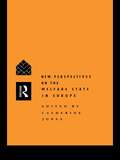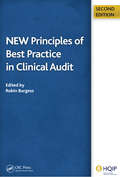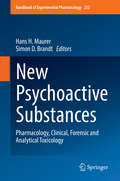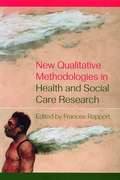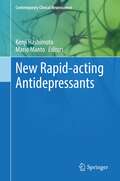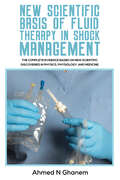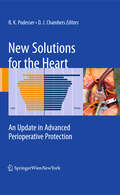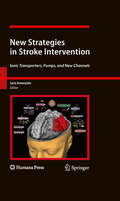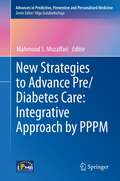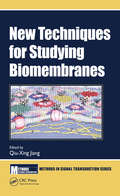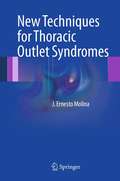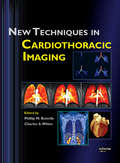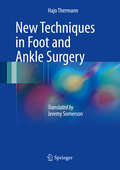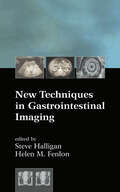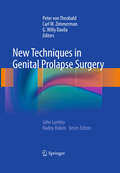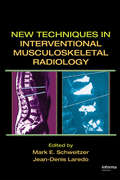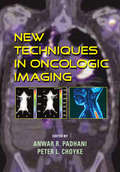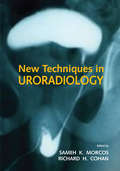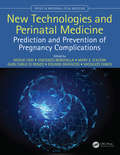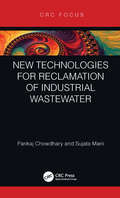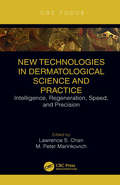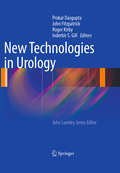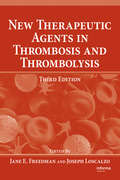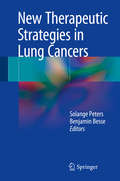- Table View
- List View
New Perspectives on the Welfare State in Europe
by Catherine JonesNot since the 1940s has there been such comprehensive scope for uncertainty within and about Europe. New Perspectives on the Welfare State in Europe offers an appraisal of comparative social policy and applies it to current uncertainties concerning European communities and European-North American and East Asian relationships. Including contributions from Deakin, Klein, Leibfried, Mishra and Rose the work should provide essential reading for students, researchers, lecturers and policy makers in social policy, politics and sociology.
New Principles of Best Practice in Clinical Audit
by John Moorhead Robin BurgessWith the NHS committed to making quality the centre of treatment, clinical audit - a proven and effective process for measuring quality and driving its improvement - has never been a more topical issue. Now thoroughly updated and rewritten, this new edition describes the process by which health professionals, managers and other NHS staff can assess the standard of care they deliver and how closely it corresponds with recommended best practice. It sets out the key principles of clinical audit practice, detailing advances in recent years such as simplified and accelerated audit, improved patient involvement, attention to ethics and methodology and the embedding of clinical audit in organisational governance as well as clinical practice. This book is essential reading for all those who undertake clinical audit or are training to do so, including health practitioners, managers and commissioners in the NHS. It will also be useful to patients who contribute to audit governance. Reviews from the first edition: This book should be available in all trusts and recommended to those of both junior and senior status who are about to invest time and energy in an audit project.' MEDICAL PROTECTION SOCIETY [W]ell-structured with summaries set out as key points throughout. The appendices give invaluable information on numerous websites for clinical guidelines, on clinical audit and clinical governance.' PHYSIOTHERAPY JOURNAL
New Psychoactive Substances: Pharmacology, Clinical, Forensic and Analytical Toxicology (Handbook of Experimental Pharmacology #252)
by Hans H. Maurer Simon D. BrandtThis volume is designed to feature the pharmacology of new psychoactive substances, legislative aspects, information exchange including epidemiology, and clinical, forensic, and analytical toxicology in order to facilitate the understanding of this complex and rapidly developing phenomenon.
New Qualitative Methodologies in Health and Social Care Research
by Frances RapportThis edited volume brings together innovative contributions from a range of health and social care professionals and research scientists who are interested in introducing new approaches to qualitative research into the world of health and social care.A range of methodologies including discourse analysis, imagework, cut-up technique, minimalist passive interviewing technique and social action research are discussed along with their histories, methods and their applicability to practice. Illustrated by examples drawn from clinical and practice settings, the book also explores recent developments and their implications for, and impact on, delivery and good practice evaluation in health and social care. The book encourages an in-depth appreciation of the concept of evidence - what it means, how it is arrived at and the consequences of it being applied, and: enables health and social care professionals, academics and students to learn more about new qualitative methodologies broadens understanding of notions of good practice encourages new thinking about the application of methodologies to practice.
New Rapid-acting Antidepressants (Contemporary Clinical Neuroscience)
by Mario Manto Kenji HashimotoThis book discusses new candidates for rapid-acting antidepressants, such as (R)-ketamine, (2R,6R)-hydroxynorketamine, scopolamine, mGluR2/3 antagonists and AMPA receptor agonists. There are serious limitations to currently available antidepressants, such as delayed onset and low rates of efficacy. The discovery that a single dose of ketamine, an NMDAR antagonist, can produce rapid antidepressant effects that are sustained has led to new research in this area. In this volume, a variety of novel pharmaceutical treatments are examined. This volume would be useful to both researchers and clinicians who work in the field of pharmacology, specifically CNS drug treatments.
New Scientific Basis of Fluid Therapy in Shock Management: The Complete Evidence Based On New Scientific Discoveries In Physics, Physiology, And Medicine.
by Ahmed N GhanemThis book would interest all scientists, doctors and nurses involved in the prescription and administration of fluid therapy in the management of shock, acutely ill patients and those undergoing major surgery. It reports on fourteen new scientific discoveries in physics, physiology and medicine that form the new scientific foundation of fluid therapy which will revolutionise current understanding and practice.
New Solutions for the Heart
by David J. Chambers Bruno K. PodesserAlthough cardiac surgery has made an enormous progress during the last decades, the discipline has to cope with essential changes: Patients are increasingly cared for by cardiologists and therefore referred to the surgeon in a later stage of disease. Consequently, they are more often in an increasingly serious state or in advanced age with significant comorbidities. In order to meet the requirements of these different patient groups, cardiosurgical treatments require special protectional strategies for the heart in order to perform the planned operations safely. This book presents the latest knowledge of modern techniques of myocardial protection taking into consideration the different patient groups and current scientific strategies. Furthermore, it discusses present and future scientific approaches in myocardial protection and preservation.
New Strategies in Stroke Intervention
by Lucio AnnunziatoIschemic brain damage represents a major source of morbidity and mortality in westernized society and poses a significant financial burden on the health care system. To date, few effective therapies have been realized. Recent evidence, however, suggests that channels, pumps, and ionic exchangers are involved in CNS ischemia and ischemic stroke, but the potential contribution of these channels for curing stroke is far less understood than for many other normal and pathological conditions. New Strategies in Stroke Intervention: Ionic Channels, Pumps, and Transporters, analyzes the roles played by targets in stroke development and the potential action of drugs modulating these proteins. This book provides a groundbreaking review of these ionic channels, pumps, and transporters as regulators of neuronal ionic homeostasis, providing a better understanding of ischemic brain disorders and the new pharmacological avenues for a cure.
New Strategies to Advance Pre/Diabetes Care: Integrative Approach by PPPM
by Mahmood S. MozaffariThis book is intended to provide up-to-date and emerging information in the field of diabetes mellitus with a focus on preventive, predictive and personalized medicine.
New Techniques for Studying Biomembranes (Methods in Signal Transduction Series)
by Qiu-Xing JiangNew Techniques for Studying Biomembranes describes some of the latest methods used to investigate the dynamic distribution of specific lipids in membranes and their effects on other membrane components. The contributors present important discoveries with respect to lipid analysis and lipid interactions with membrane proteins. Various methods, which have been used to study lipid bilayer structure and lipid organization in membranes, include both in vitro and in vivo membrane systems, and study membrane proteins in various membrane systems. Key Features: Reviews both in vivo and in vitro analytical technologies and methods for studying membrane structure and function Explores how lipid bilayers and membrane proteins interact Includes contributions from an international team of researchers actively studying membrane structure and function Identifies various diseases whose causes are related to membrane proteins Related Titles: Christopher R. Jacobs, Hayden Huang, and Ronald Y. Kwon. Introduction to Cell Mechanics and Mechanobiology (ISBN 978-0-8153-4425-4) Wendell Lim and Bruce Mayer. Cell Signaling: Principles and Mechanisms (ISBN 978-0-8153-4244-1) Stephen Rothman. Proteins Crossing Membranes: A Scientist’s Memoir (978-0-3670-7449-4)
New Techniques for Thoracic Outlet Syndromes
by J. Ernesto MolinaNew Techniques for Thoracic Outlet Syndromes presents in a comprehensive format an up-to-date, state of the art reference that physicians can use in consultation to properly treat patients using the resources that modern medicine offers. This book offers the newer surgical approaches that have been developed during the past 30 years. Some of these techniques are modification of operations that were proposed previously but were not fully affective and left many patients suffering with permanent disability. This textbook is a compendium of the proper management of these patients that cannot be found in isolated reports of literature. The neurogenic-arterial thoracic outlet syndrome section covers how to diagnosis the illness using the proper tests, therefore eliminating the use of expensive, uncomfortable and inconvenient tests. The text is organized in three basic sections that cover all the aspects of the thoracic outlet syndromes. The first section addresses the neurogenic-arterial type, with the pertinent subsections: symptoms, diagnosis. A list of the useful tests is provided to make a correct diagnosis of this syndrome. This is followed by the sections on treatment, using the surgical approaches with historical aspects and evolution of the operations proposed. The second section involves the venous thoracic outlet syndrome divided into the corresponding subsections comprising: symptoms and physical findings, etiology, diagnosis. This section also includes a list of the usual tests to make the proper diagnosis. The last section of this text is dedicated to the presence of cervical ribs and their classification of the different types that occur, and also the proper surgical treatment when fusion of the upper ribs is present. New Techniques for Thoracic Outlet Syndromes offers the current, acceptable and most effective methods to handle thoracic outlet syndromes. It will be of great value to thoracic surgeons, vascular surgeons, interventional radiologists as well as fellows and residents in training for cardiothoracic and vascular surgery.
New Techniques in Cardiothoracic Imaging
by Charles S. White Phillip M. BoiselleNew Techniques in Cardiothoracic Imaging emphasizes emerging methods in computed tomography, magnetic resonance imaging, positron-emission tomography, and similar technology. Effective use of these tools can facilitate the identification, analysis, and treatment of diseases and disorders commonly encountered in daily clinical practice. The contribu
New Techniques in Foot and Ankle Surgery
by Hajo ThermannThis book presents in exquisite detail numerous new surgical techniques for the treatment of foot and ankle conditions, as well as the latest refinements of established procedures. All operations are depicted step by step with the aid of superb illustrations, with precise and succinct accompanying descriptions. The author is an expert in the field, with many years of experience, whose goals here are to facilitate the smooth translation of theory into practice and to stimulate further discussions and communications regarding optimal surgical management. The book is already in its second edition in German. Among the key features of this first English edition are the latest advances in arthroscopy, surgical procedures on the Achilles tendon, interventions for treatment of lateral ligament and syndesmotic ankle injuries, surgical interventions on the metatarsophalangeal joint, surgical correction of hindfoot deformities, forefoot surgery, and ankle arthroplasty. The book will be of value for foot and ankle surgeons at all levels.
New Techniques in Gastrointestinal Imaging
by Steve Halligan Helen M. FenlonAs continuing advances in computed tomography, ultrasound, magnetic resonance imaging, and nuclear imaging spur the development of more accurate, safer, and less invasive modalities for gastrointestinal imaging-quickly rendering traditional procedures obsolete-medical professionals need only look to this definitive step-by-step guide for introducti
New Techniques in Genital Prolapse Surgery
by G. Willy Davila Carl W. Zimmerman Peter Von TheobaldApproximately 11% of women have undergone surgery for a genital prolapse by the age of 80 and these procedures are now among the most common and frequent operations in females after hysterectomy and c-section. As life expectancy increases and as patients demand a higher quality of life, the number of patients (and surgeons) concerned with this issue is growing. Many of the common techniques for prolapse repair are unchanged since the end of the 19th century when most of the techniques were established. If the 80's and 90's were the years of the laparoscopic surgery revolution, the new millennium has started with the urogynaecologic surgery revolution, but there is a difference. While laparoscopic surgery was trying to mimic the same techniques as traditional surgery through a new approach, the new prolapse surgery is trying to modify dramatically the traditional techniques through the same incision. Application of mesh to other areas of surgery for prolapse repair was a logical consequence of the success of TVT and SUI (Tension-free Vaginal Tape and Stress Urinary Incontinence) surgery. Mesh procedures started becoming popular in the new millennium and aimed to be less invasive and more efficient than the traditional techniques. After 5 years of evolution, standardized techniques have emerged for cystocele repair, vault prolapse suspension, and enterocele and rectocele repair. A high interest for these new techniques is shown by all pelvic floor surgeons including those who were the pioneers of the procedures, those already using these techniques, those who are still afraid to use them, and those who are hostile because of allegiance to the technique of plication. Surgeons need information about mechanically superior anatomically restorative pelvic organ prolapse procedures. Most of the papers published in the concerned journals (IUJ for example) are on this subject, but to date, no book has been published. It is time now for a well-researched title containing simple, practical, and useful information written by international experts in this field.
New Techniques in Interventional Musculoskeletal Radiology
by Mark E. Schweitzer Jean-Denis LaredoThis reference documents state-of-the-art trends and advancements in the utilization imaging modalities for the analysis of bones and their surrounding soft tissues, including muscles, tendons, ligaments, nerves, and blood vessels. Exploring technologies such as ultrasound, MRI, CT, CT arthrography, MR arthrography, and fluoroscopy, this source con
New Techniques in Oncologic Imaging
by Anwar R. Padhani Peter L. ChoykeExploring a wide spectrum of oncologic imaging technologies with current and future applications ranging from ultrasound and PET to MRI, this reference analyzes recent developments concerning every available imaging technique-furnishing the most up-to-date research on technological advances in cancer imaging and their potential impact on patient ca
New Techniques in Uroradiology
by Richard H. Cohan Sameh K. MorcosThis comprehensive reference discusses the use of ultrasound, computed tomography (CT), magnetic resonance imaging (MRI), and radioisotopes in the imaging of the adult and pediatric urinary tract. With contributions by leading authorities in the field, this source covers a wide array of uroradiological topics ranging from the use of MRI or multisli
New Technologies and Perinatal Medicine: Prediction and Prevention of Pregnancy Complications (Series In Maternal Fetal Medicine)
by Vassilios Fanos Gian Carlo Di Renzo Moshe Hod Vincenzo Berghella Mary E. D’Alton Eduard GratacósThe potential impact of work being conducted in genomics, proteomics, and metabolomics upon clinical practice for gynecologists is immense but not yet completely appreciated. This groundbreaking text from international experts examines the newest topics on the perinatal agenda and gives clinicians a real look into the future via the newest methodologies.
New Technologies for Reclamation of Industrial Wastewater
by Pankaj Chowdhary Sujata ManiNew Technologies for Reclamation of Industrial Wastewater provides information on several types of industrial wastewaters containing a variety of toxic and recalcitrant compounds. It also focuses on the ecotoxicological and health hazards posed by the chemicals released along with industrial effluents. It covers various conventional as well as modern wastewater-treatment technologies and their advantages and disadvantages. Features: Elucidates various types of industrial wastewaters generated, their fate and consequences Describes the ecotoxicological and health implications of industrial contaminants Provides details on conventional treatment technologies along with modern and emerging wastewater-treatment methods Discusses the merits and demerits of both conventional and emerging treatment technologies
New Technologies in Dermatological Science and Practice: Intelligence, Regeneration, Speed, and Precision
by Lawrence S. Chan M. Peter MarinkovichWhile science and technology have been moving at speed in the last decade and major investments have been placed in Artificial Intelligence, blockchain technology, 3D printing, and gene editing, medical practice, including cutaneous medicine (otherwise known as Dermatology), is only just starting to follow these technological advances. This book is a timely intellectual investment for cutaneous medicine, addressing these particularly needed areas. It is written for medical educators, dermatology residents, practicing dermatologists, and medical researchers in the area of skin diseases, to alert them all to medical advances and up-and-coming technology and in the hope, it will inspire further novel methodology for the future of cutaneous medicine, in diagnosis and therapy.
New Technologies in Urology
by Prokar Dasgupta Inderbir S. Gill John M. Fitzpatrick Roger KirbyThis book provides up-to-date information on the newest technological developments in the field of urology. An extensive and comprehensive book that provides the ultimate reference in urological tools, methods and techniques, this text is written by the most highly acclaimed experts known in their field. A wide and diverse range of the most major technologies are covered including laser prostatectomy, flexible robotics, prostate focal therapy and renal cryo-ablation. New Technologies in Urology is an educational, easy-reference work, covering specific surgical techniques and patient care, supported by a number of illustrations and clear summary tables.
New Therapeutic Agents in Thrombosis and Thrombolysis
by Joseph Loscalzo JaneE. FreedmanAs the number of patients with thrombosis and thrombolysis increases, there is a critical need for clinicians to learn the latest scientific discoveries and treatment options. This timely Third Edition is a comprehensive text for cardiologists, hematologists, and pharmacologists in need of a resource on current agent development technology for trea
New Therapeutic Strategies in Lung Cancers
by Solange Peters Benjamin BesseThis book provides an up-to-date review of current management techniques for Non-Small Cell Lung Cancer. It addresses all of the latest issues that have been raised by the discovery of oncogenic drivers and the improvement of diagnosis and therapeutic methods, including new radiotherapy techniques and anticancer strategies like immunotherapy. New strategies for patients with molecular alterations and the management of particular types of cases are also highlighted. Written by recognized experts in their field, the book represents a unique and valuable resource in the field of lung cancer, both for those currently in training and for those already in clinical or research practice.
New Therapies in Advanced Cutaneous Malignancies
by Mario Mandalà Piotr RutkowskiThis book provides a detailed overview of the activity and efficacy of new treatments and promising perspectives in the field of cutaneous malignancies. The first part of the book covers the basic molecular and immunological mechanisms. It then goes on to cover specific strategies in melanoma and non-melanoma skin cancers that, starting from the basic mechanisms, translate this information into clinical routine or translational research. This unique handbook comprises very practical structured descriptions of more than 10 new agents used in treatment of melanomas and skin carcinomas together with biological background of their mechanisms of action. It provides structured and up-to-date information about all therapeutics in cutaneous malignancies, making it extremely useful in clinical practice, for clinicians that need timely and focused information. Prepared by a group of international authors from expert melanoma centres in Europe, the book provides knowledge distilled from the diverse perspectives of the contributing authors (pathologists, translational scientists and clinicians). This book is of interest to medical oncologists, oncological surgeons, dermatologists and immunologists as well as biologists and pharmacologists.
